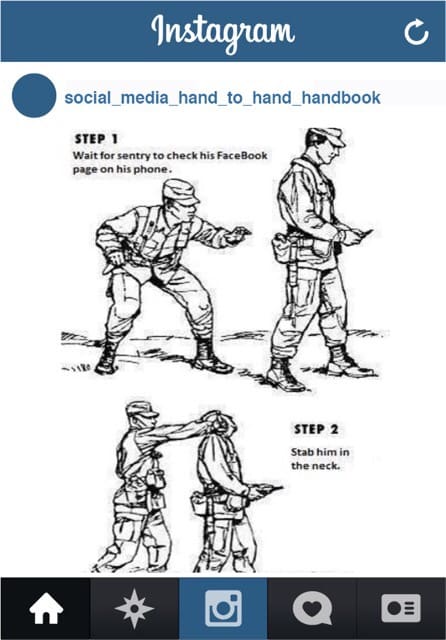Today’s Instagram, Tomorrow’s Doctrine
June 27th, 2016
Aaron Barruga
Our attention spans are garbage. I can’t remember the last time I waited for an Uber to arrive and decided not to spend the downtime thumbing through Facebook and Instagram. As a millennial, I am guilty of forfeiting periods of self-reflection in exchange for the external stimulus provided by social media.
But is this dynamic something to be concerned with? In small doses, probably not, but my default to social media extends beyond waiting for Ubers to running errands, coffee lines, and as a work distraction (current piece included). The result, I am continuously seeking new content that reinforces “my” point of view.
The visual medium is powerful and a fifteen second Instagram video can easily accomplish what 1500 words cannot. However, substituting visuals for text comes at the deterioration of our deep focus and willingness to thoroughly examine arguments. We forgo substantiating our own beliefs with evidence (or dare I say experience), and instead reinforce our superficial expertise by simply watching a video.
Accompanying our echo chamber is the perception that we are capable, rational, and intelligent individuals; and that anyone who disagrees with us is both wrong and delusional. Our deep attention and focus already eroded by the brevity of social media, we also lose our patience for curiosity when confronted with opposing views.
Rather than first attempting to understand how our opposition arrived at their point of view, and then afterwards engaging in debate. We instead fill cognitive sandbags and entrench in our own belief system. But how are we so sure we are right? Because everyday (and for some every hour) we are bombarded with new content on social media that reinforces our point of view.
Although social media is a powerful tool that has built a community and united shooters on unprecedented levels, it is also the platform that allows for the rapid decay of objective knowledge, because we (millenials) are conditioned to constantly seek something new, and upon discovery will associate new with better.
Millenials are now more representative of average adults in America. Born between 1980 and 2000, millenials number 83 million and represent one quarter of the US population. For today’s military and law enforcement leadership, a majority of mid-level and soon to be senior leadership embodies the tech savvy, social media oriented demographic of twenty to thirty year olds.
This group of leaders will decide in the next decade what becomes doctrine for both the future of military and law enforcement training. Like it or not, social media will be a key influencer in this process. Current and soon to be training supervisors already connect with the training narratives created in fifteen second Instagram videos. This dual edged sword allows for greater access to information, but also allows for deviation away from lessons learned in the real world.
From lessons learned we build doctrine and standard operating procedures. Unfortunately, this process involves losing brothers and sisters in the line of duty. Learning from their mistakes and shortcomings, we attempt to find new and better techniques for engaging dangerous situations. However, we must exercise a healthy dose of caution in this process, and recognize that new techniques in their infancy must first survive critique and peer review before being endorsed as acceptable. Unfortunately, social media encourages us to shortcut the validation process and sanction incomplete or weak arguments simply because they are new.
Many tactical training schools made popular by social media have done an enthusiastic job of training organizations and individuals, but for the most part they have not prepared tactical shooters with judgment for the real world. Consequently, a lot of flat range training is suitable for use only on the flat range.
In twenty years, the next generation of tactical shooters will adapt our current social media influenced doctrine to address new threats, technologies, and radical ideology. It is uncertain whether platforms such as Instagram will exist in the future and how integrated they will be in our day-to-day lives. For now, social media’s inaugural authority on the advancement of doctrine can either become a platform for knowledge, or devolve into a medium through which companies exploit the naive, and users scream at each other in comment threads with pitchfork outrage.
Aaron is a Special Forces Veteran and founder at Guerrilla Approach LLC.
www.guerrillaapproach.com
www.instagram.com/guerrilla_approach
www.facebook.com/guerrillaapproach
Tags: Guerilla Approach




Profoundly accurate and timely thoughts.
Of course they just don’t apply to training.
Well done!
Well put. The double edged nature of social media impacts not only shooting doctrines, but other topics as well: religion, politics, work, etc. Detriment to these areas can result in far worse impact on society as a whole.
Thank you for putting this out so eloquently.
Its odd how people can be profoundly confident about issues they barely understand.
May shock some of you, but i’m 25 (well, turning 26) and I don’t have Facebook, Instagram, Twitter or any of the other popular social media stuff that’s the norm these days. Only use WhatsApp because it’s an easier mode of communication when the carrier charges an arm and a leg for local calls.
Try deleting some of your social media accounts, it’s actually liberating.
That sounds sublime
I just turned 29 a few hours ago. And I too have no social media. I love it. I can actually have a conversation with someone. Instead of my face Barrie’s into my phone.
It’s funny because when I tell people that, people automatically assume i’m a luddite of some sort adverse to modern technology. However technology has always interested myself since I was a young un, from having a Sega Saturn to “building” my own computers and now rooting Androids and jailbreaking iDevices etc. and individuals seem to be ever more ignorant despite the internet making information so readily available these days.
I guess it kind of amuses (? maybe not the right word) myself how many people buy into the social media hype and “internet of things” ideas without knowing what and how things really tick and its consequences. It seems like in the 21st century people’s personal information and data are being valued more than “traditional” commodities (oil, precious metals) yet individuals so readily surrender such information for what seems like miniscule returns.
I’m not against social media per se, however one needs to understand that putting your private life out there isn’t generally a good idea. It’s amusing too how I can google the names of my fellow infantrymen and be able to gather so much information about themselves, in some cases down to the addresses they live in. Is it worthwhile giving up your anonymity and personal security to companies who, in the grand scheme of things, sell on your personal information to marketeers anyway?
“Accompanying our echo chamber is the perception that we are capable, rational, and intelligent individuals; and that anyone who disagrees with us is both wrong and delusional. Our deep attention and focus already eroded by the brevity of social media, we also lose our patience for curiosity when confronted with opposing views.”
THIS! THIS! THIS! I am currently working on a project and I have asked several people for opinions on portions of the work. They give their opinion and then I say, “Well I was thinking this when I did it this way” to start a conversation/debate in hopes of coming to a solution. Several times people have immediately thrown up their hands and declared “You have your mind made up!” and then walked away. What happened to debate and defending your stance in the process of coming to a common ground? It seems like they want you to blindly accept their first response and change what you are doing.
Its that safe space mentality.
Aaron,
Spot on as always. I just wish I had thought of “cognitive sandbags” first!
TLB
I attended a high-powered marketing conference last week where they revealed studies that show the average American attention span is now THREE seconds, precisely the same as a goldfish (this is not a joke, unfortunately). This is down from an average of six seconds about eight years ago.
More and more European cities already have or are in the process of installing traffic lights (walk/don’t walk) IN the sidewalk at intersections because “smart phone” users refuse to look up and many have been hit by cars making legal turns. This is not a joke either.
I suppose some would call them Darwin Award spoilers.
Aaron continues to deliver some of the most thought provoking articles I read in the industry today. Great work.